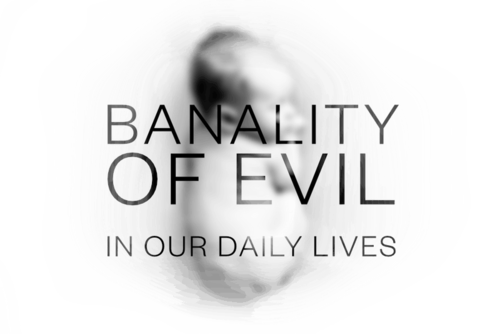
Can one do evil without being evil?
This was the essential question Hannah Arendt asked herself when she reported for the New Yorker in 1961 in the trial against Adolph Eichmann, the former head of the “Central Office for Jewish Emigration” who was involved in the organization of the expulsion and deportation of the Jews and who was jointly responsible for the murder of an estimated six million people. Arendt came to the conclusion: “As cruel, cold-hearted, and in their extent monstrous as the deeds for which Eichmann was responsible were, so ordinary, even so banal was the human being who stood for these deeds. She called this thoughtlessness the "banality of evil.”
“The Banality of Evil in our Daily Lives art prize was conceptualized by the artist Saysay.Love. As a seeker of truth, he was inspired by these writings. He immediately felt a strong connection with the subject matter. The idea that many of history’s greatest evils, instead of being carried out by fanatics or sociopaths, were instead done by ordinary people who accepted the premises of their state and thus their actions, as “normal.”

Ultimately, the question arises from which perspectives we can view the banality of evil in everyday life. Everyone defines for themselves the boundary between good and evil, right and wrong. Just as dualism itself can only exist within its own contradiction, it is the responsibility of each individual to consciously perceive and question the boundaries associated with and created by himself.
Saysay.Love proposes that art can change minds and hearts. It is a way to understand us as part of a bigger whole, to dissolve boundaries and to support us as an indicator of the conscious in relation to profound paradigm shifts in the vitality of independent thinking.
There has never been a more pressing time for an unconventional approach to find meaning and purpose in our increasingly complex lives.
We are at a crossroads - today our technological prowess far exceeds awareness of our ethical pitfalls. We are walking on the edge of our demise, never before reached as close in all of recorded history.
Our beloved ideals and morals all fall short because we are too busy representing ourselves. They can no longer be used as a true compass in a world amidst epistemic and ecological collapse.
Can our art catalyse a change, can it be used as a light on the path to a better future? Can our art and technology become the immune system for the collective psyche drowning in an endless stream of misinformation and entertainment? Can they help us shatter the mould of our fears, heal and mend where we are broken? Can they help us find our new mythos, a new story which could unite us and provide a framework to make sense of the complex world we inhabit today?
We believe so.


from Tumblr https://samheydt.tumblr.com/post/616749724207382528

No comments:
Post a Comment